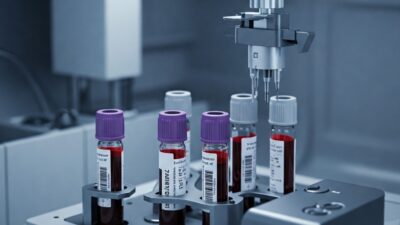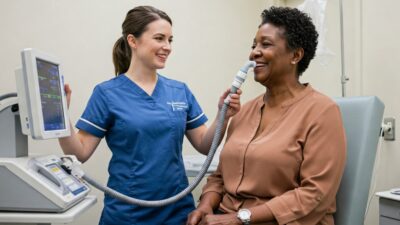Considering booking a private health check up, but want to know more about what a full body health screen can actually detect? This the article for you!
Key Takeaways
- Full body health checks can spot early signs of important health problems, like heart issues, cancer, lung conditions, or problems with your liver, kidneys, and digestion – sometimes before you feel any symptoms.
- You’ll often get advice on how to improve your lifestyle, like tips on eating better, moving more, or managing stress, based on your results. This can help you stay healthier in the long run.
- Finding health issues early makes a big difference as it usually means treatment works better and your chances of staying well are much higher.
- Not all health check ups are the same. Some are basic, others are super detailed, and what they can find depends on how advanced (and expensive) the package is. It’s good to check what’s included before booking.
Detecting Heart Health Issues
Detecting cardiovascular health issues is a key component of nearly all health screens – even the most basic packages. Blood pressure and cholesterol levels, measured during regular checks, serve as important indicators of heart health.
Some screenings also include an electrocardiogram (ECG) to evaluate heart rate, rhythm, and electrical activity. Blood tests usually also test your cholesterol levels and can also test inflammation markers. These comprehensive assessments not only measure your current health status but also calculate your risk of cardiovascular events like stroke or heart attack over a decade.
Identifying Early Signs of Cancer
A lot of people ask us whether private health check ups include cancer screening. The short answer is: sometimes, yes – depending on the type of health screen package you choose.
Private health checks can help spot signs of certain cancers early, often before any symptoms show up. The tests you get usually depend on your age, gender, medical history, and how detailed (and expensive) the package is.
For example, some blood tests can pick up signs of cancer – like PSA for prostate cancer or CA125 for ovarian cancer. More detailed check ups might include scans like ultrasounds, CT scans, or even full body MRIs, which can look for unusual lumps or growths in your organs, such as your lungs, liver, or kidneys.
Some packages also include mammograms (for breast cancer) or colonoscopies (for bowel cancer), and these may be offered earlier or more often than through the NHS. This is especially true if someone has a family history or is at higher risk.
It’s important to remember that not everyone needs every test. Too much screening can sometimes pick up things that would never have caused a problem, but might still lead to extra tests or treatment.
Still, private screenings can be a great way to stay on top of your health and catch things early—when they’re easier to treat.
Assessing your Lungs
Private health check ups often include breathing tests to see how well your lungs are working. These are especially helpful if someone smokes, lives in a polluted area, or has ongoing issues like coughing, shortness of breath, or wheezing.
One of the most common tests is called spirometry. It’s simple – you breathe in and out through a tube, and the machine measures how much air you can blow out and how fast. This test can spot early signs of conditions like asthma, COPD, or emphysema, sometimes even before you feel any symptoms. If you already have a lung condition, it can help track whether things are getting better or worse.
Some private assessment clinics offer more detailed lung checks too. These might include tests that measure how much oxygen is in your blood, chest X-rays, or even detailed scans called CT scans that show the inside of your lungs. These can help find problems like lung scarring, infections or, in rare case, early signs of lung cancer.
Check your Liver & Kidney
Your liver and kidneys are like the body’s built in cleaning team – they filter out waste, process what you eat and drink, and help keep everything running smoothly. That’s why many private health check ups include tests to see how well these important organs are working.
Liver checks usually involve a simple blood test to look for signs of stress or damage. If the liver is inflamed or struggling, certain substances in the blood will be higher than normal. This could be caused by things like drinking too much alcohol, certain medications, or conditions like fatty liver disease. Some advanced check ups might also use scans to look at the liver’s size and texture, helping to spot problems early – even if you feel fine.
Kidney tests are also straightforward. A blood test can show how well your kidneys are filtering waste, and a urine test can pick up signs of damage or infection. Some private clinics also offer kidney scans to get a more detailed picture.
Checking your Gut
Your digestive system, also called your gastrointestinal (GI) system, is what helps break down food, absorb nutrients, and get rid of waste. When something isn’t right, it can cause all kinds of problems like stomach pain, bloating, heartburn, or changes in your bowel habits. Private health checks often include tests to spot early signs of digestive issues, even if you don’t have symptoms yet.
One common test is a blood check for signs of inflammation, infections, or problems like coeliac disease (where your body can’t handle gluten). Some health checks also look for signs of anaemia, which can sometimes be linked to hidden bleeding in the digestive system.
More advanced health screen packages might include a stool (poo) test to check for infections, gut bacteria balance, or even tiny traces of blood. This can be an early sign of conditions like bowel cancer. Some clinics offer breath tests to spot things like food intolerances due to bacteria growing in the wrong part of your gut.
Other Tests
There are a number of other issues a private health screen can detect, depending on which package you choose and how thorough it is. These may include:
- Hormonal imbalances: Hormones are like your body’s messengers and they control everything from energy levels to mood, sleep, and growth. If your hormones are too high or too low, it can make you feel tired, anxious, moody, or affect your weight. A health screen can check things like testosterone, oestrogen, cortisol (your stress hormone), and others.
- Vitamin deficiencies: Vitamins help your body work properly. If you’re low in important ones like vitamin D, B12, or iron, you might feel tired, weak, or even dizzy. A blood test can spot these problems early so you can fix them with changes to your diet or by taking supplements.
- Diabetes or prediabetes: A health screen can measure your blood sugar levels to see if your body is struggling to control sugar. Catching this early means you can make lifestyle changes before it becomes full diabetes.
- Thyroid disorders: The thyroid controls your metabolism. If it’s underactive or overactive, it can cause weight changes, tiredness, or mood swings. Blood tests check how well it’s working.
Advanced Detection Tests
Advanced and more expensive private health screens may go far beyond standard checks by incorporating cutting edge diagnostics. These more advanced tests are designed for individuals seeking a proactive and data rich understanding of their health.
One standout feature is the full body MRI scan, which can detect abnormalities, tumours, or early signs of disease in organs, soft tissues, and the brain, with a key benefit that a MRI does not give radiation exposure. Some advanced or cardiac specific health screen packages include CT coronary angiography to assess heart artery health. This can detect early signs of coronary artery disease, even if you don’t have symptoms.
Premium health assessment packages also commonly include more advanced blood panels. This can cover hundreds of biomarkers including inflammation markers, hormone levels, vitamin and mineral deficiencies, cancer markers. It may even include genetic tests to see if you may be more likely to develop certain diseases.
Other more high end health screens might include DEXA scans for bone density, VO2 max testing to assess cardiovascular fitness. High sensitivity ECGs may look closer at your heart, and there may also be gut microbiome analysis for insights into digestive health and immunity.
Wrapping Up
There’s a lot a private health assessment can include! We hope we haven’t thrown too much at you in one go, but we want to be thorough! Have a read of the skreen Advice Hub if you’re looking for more information.
About our Content
skreen is not a medical provider and does not diagnose or treat conditions. Our content is informational and should not replace professional medical advice.
We’re serious about being a trusted source of information and sharing only the highest quality, medically reviewed content. You can review our Content & Editorial Policy here.




